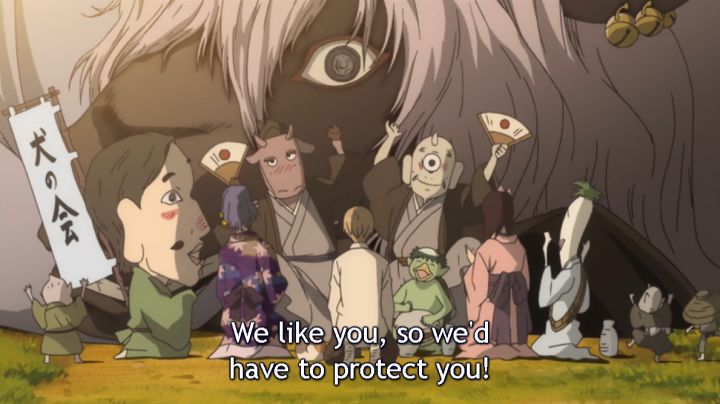(This "Answer" is actually a reply to @кяαzєя comment to previous answer. I wanted to post a picture and provide full context for the episode he mentions.)
I re-watched season 3 episode 13 (episode 39 on Crunchyroll, which merges the first 3 seasons into a stream of episodes numbered 1 to 39). I really appreciate the pointer. Beginning at time mark 8:29, the group is formed during the following conversation (oY = one-eye yokai, bY = bull yokai, N = Natsume):
- oY: So we're all getting together tomorrow for a drinking party.
- bY: We will!
- oY: So, all of the yokai who know you have gotten together to throw the first annual
- oY: "Party for Natsume-sama in the Run-down Old Shrine Near Yatsuhara."
- bY: Run-down, run-down.
- oY: A party for all those who have to put up with Natsume-sama's whining and meddling, and run to him like dogs if he needs us.
- oY: You could call us the "Natsume Dogs"!
- ?Y: Bark!
- N: What kind of name is that?
(General note for those who don't watch the series -- Natsume avoids calling for help even when he needs it. The only yokai he calls is Madara, his powerful self-appointed bodyguard. But the others do like him and would help.)
Here is a screen-cap from the end of the episode, at the party showing Natsume and the Natsume Dogs:
 Madara, in his small, Nyanko-sensei, cat form is next to Natsume, can barely be seen from his rear, between the text and next to Natsume. I'm pretty sure the sign being held on the left is the same Japanese which @Jimmy told us was Gathering of Dogs.
Madara, in his small, Nyanko-sensei, cat form is next to Natsume, can barely be seen from his rear, between the text and next to Natsume. I'm pretty sure the sign being held on the left is the same Japanese which @Jimmy told us was Gathering of Dogs.
So, in summary, I believe my question did post the first usage of the phrase dog's circle, although this group was formed episodes previously as the Natsume Dogs.

